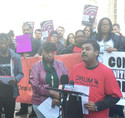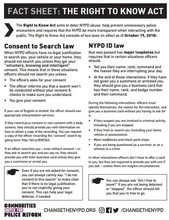
The Right To Know Act is a legislative package that aims to protect the civil and human rights of New Yorkers while promoting communication, transparency and accountability in everyday interactions between the NYPD and the public. New Yorkers want to live in a safe city where the police treat all residents with dignity and respect, and where police are not considered to be above the law.
For immediate release: December 14, 2017Urge passage of other half of Right to Know Act, Intro 541-C, that is effective and supported by 200+ groups & families of police brutality victims
For immediate release: December 12, 2017In response to Right to Know Act bills being laid to age last night for an impending vote, Communities United for Police Reform released the following statement from spokesperson Monifa Bandele.
For immediate release: November 16, 2017In response to Right to Know Act lead sponsors, Council Members Antonio Reynoso and Ritchie Torres, failing to take action on the legislation at today’s Stated Meeting and an anonymously sourced report about a deal being on the table, Communities United for Police Reform released the following statement from spokesperson Monifa Bandele.
“There is no deal on the Right to Know Act without non-emergency investigatory policing encounters being covered, including when police are doing investigatory questioning at Level 1 encounters. If a police officer can ask you for identification in non-emergency situations, there is no reason New Yorkers should be left without the identity of the officer and the reason for the encounter in such situations. Any purported bill that seeks to provide such a gaping loophole has no agreement from advocates and communities.
Ritchie Torres is grappling with how the coronavirus pandemic is affecting his likely New York district’s mental health and opening up about his own.
BuzzFeed NewsWASHINGTON — At 32, Ritchie Torres has already been a star in New York City politics for years.
At 25, he became the youngest member of the City Council. Soon, he’ll likely become one of the youngest members of the House, and, along with fellow New York Democratic congressional nominee Mondaire Jones, the first openly gay Black member of Congress.
Advocates and elected officials who say police officers are disobeying and at times even mocking a police accountability measure implemented last year rallied at City Hall April 29 to demand action minutes before lawmakers grilled NYPD officials about that law during an oversight hearing.
For immediate release: April 29, 2019New York – Today, members of Communities United for Police Reform, police reform advocates, and New York City Council Members held a press conference at City Hall to condemn the NYPD for violating and undermining key provisions of the Right to Know Act, a package

On October 19th, the Right to Know Act (RTKA) was implemented as New York City law. This is a huge win for New Yorkers, especially the most impacted community members – those who are working class, undocumented, and face regular police abuse.

New York City recently took an important step toward police reform. The long-anticipated Right To Know Act has officially gone into effect, with important provisions dictating police-civilian encounters. The Act includes critical laws that will help end unconstitutional searches and require that police officers both identify themselves and provide the reason for an encounter – even leaving a business card in certain interactions.

The Right to Know Act aims to deter NYPD abuse, help prevent unnecessary police encounters and requires that the NYPD be more transparent when interacting with the public. The Right to Know Act consists of two laws (in effect as of October 19, 2018).
Two landmark police-reform bills aiming to protect New Yorkers in their interactions with cops officially take effect Friday.

NEW YORK — New York City cops have to give business cards to people they stop and ask for permission to perform certain searches starting Friday as two landmark police-reform laws take effect. The City Council passed the contentious pair of bills, known as the Right to Know Act, last December in an effort to protect New Yorkers' rights and improve police accountability.